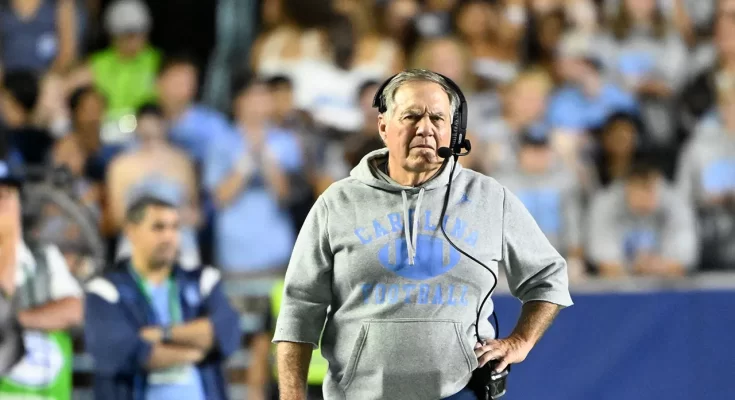A day after North Carolina’s resounding 20–3 victory over Charlotte, a significant subplot emerged when Bill Belichick, now head coach at UNC, was asked to respond to reports that the program had banned New England Patriots personnel from accessing its facilities. Belichick, whose 24‑year tenure in Foxborough secured six Super Bowl titles and nine AFC championships, paused before delivering a terse but unmistakably pointed response: “It’s clear that I’m not welcome there around their facility. So they’re not welcome in ours. Very simple.” That statement, short as it was, conveyed volumes. He reversed the inference: if Patriots access to UNC was restricted, the same would apply reciprocally.
The backdrop to this exchange is a thickening rift between the legendary coach and his former franchise. Reportedly, in August, UNC’s football general manager, Michael Lombardi—himself a former NFL executive—and the program’s pro liaison, Frantzy Jourdain, informed Patriots officials that their scouts would no longer be permitted at UNC’s practices. This communication came just one day before a Patriots scout was scheduled to visit the Tar Heels. When ESPN reached out, Lombardi simply said, “Good luck,” before hanging up the phone.
Media outlets quickly seized on the report, with ESPN and others corroborating that under Belichick’s leadership, NFL access to UNC had become unusually restricted. Scouts were only allowed to speak with Jourdain, and UNC’s internal college relations website insisted that “scouts will have zero access to coaches or other personnel people”—a phrasing repeated three times. Observers noted that while access varies among college programs, few if any impose such stark limitations. At UNC, NFL personnel could observe only three periods of practice and, notably, could not interact with the coaching staff directly
This development did not escape criticism. Some insiders characterized the ban as less a strategic decision and more an act of spite—bitterness over how Belichick felt he had been treated by the Patriots since his departure. One quoted source conveyed it bluntly: “Why would we let them in our home after how he’s been treated since he left? … We will help our players, but being treated fairly is a two‑way street.” NBC Sports’ Mike Florio went even further, saying the move was “vindictiveness and pettiness, plain and simple.”
Amid the stir, Patriots head coach Mike Vrabel was asked about the implications. Vrabel maintained a measured tone, treating the ban as Belichick’s personal decision. “That’s an individual choice,” he said. “We’ll cross that bridge when we start looking at players … that’s their prerogative … we’ll have to find other ways to get the information for any players that we want to look at at North Carolina. The platform for professional development remains critical for college players, and this sudden barrier to face‑to‑face scouting could carry real consequences.
Indeed, some analysts raised concerns that limiting access could harm UNC’s own prospects. SI opined that such a move might diminish player visibility in the tightly knit and often relationship-driven world of NFL scouting—especially for a program positioning itself as a “33rd NFL team,” one where Belichick’s pedigree is expected to give players an edge in transitioning to the league. As SI’s Grant Chachere noted, “when you make NFL scouts’ jobs harder—and go so far as to keep some of their colleagues off campus—it creates friction in a tightly knit league community. That kind of reputation could hurt a player’s visibility, making it harder to get drafted or even properly evaluated.”(SI)
Despite the menacing overtones of the ban, Belichick framed it succinctly, acknowledging the mutual exclusion without a hint of elaboration. His two‑sentence response encapsulated the dynamics cleanly: “It’s clear that I’m not welcome there … So they’re not welcome in ours.That placid delivery, here contrasted against a backdrop of rancor and tradition, captured the emotional and professional fallout of his departure from New England.
Context animates the gravity of the moment. Belichick walked away from New England after the 2023 season—24 years of domination, later reframed as a “mutual” parting, though Robert Kraft subsequently said Belichick had been fired, and labeled his own hiring of the coach a “big risk.” In response, Belichick publicly expressed that he had taken the risk by accepting the Patriots job. He has also commented on his new environment at UNC—where there’s “no owner, there’s no owner’s son”—as evidence of the liberation he now values in the college landscape.
Belichick’s unease seems deepened by recent media narratives. One ESPN‑reporter‑turned‑podcaster, Pablo Torre, sparked controversy when he claimed UNC had banned Belichick’s girlfriend, Jordon Hudson, from football facilities amid concerns about her influence. UNC quickly denied those reports, stating that while Hudson is not an employee, she remains welcome and continues managing Belichick’s brand. Belichick and Hudson both pushed back, calling the allegations false and being used as a “scapegoat” in larger stories Interestingly, the focus on Hudson—the coach’s 24-year‑old partner—could not be disentangled from the larger tension saturating Belichick’s move to UNC
Returning to the present episode, Belichick’s first win as a college coach—the 20‑3 victory over Charlotte—might have provided a sense of normalcy and optimism, but the ban reinforced the persistent friction with his former employer. In the same press availability where he praised his team’s resilience following the previous blowout loss to TCU, Belichick reiterated the reciprocal nature of the access decision
As the season progresses, the impact of the ban will be closely watched. On one hand, it underscores a firm boundary Belichick has drawn between his past and present. On the other, it raises ethical and strategic questions about player exposure, collegiate reputation, and professional courtesy. Patriots scouts may adapt by relying on game film, third‑party evaluators, or other workarounds. Whether UNC’s athletes suffer from diminished scouting opportunities or the program reaps competitive benefits by limiting distractions remains to be seen.
In essence, Belichick’s response was concise, personal, and loaded. It wasn’t a broad philosophical critique; it didn’t descend into bitter ranting. But neither was it casual or disinterested. It affirmed a clear posture: when one door closes, the other does, too. “It’s clear that I’m not welcome there … So they’re not welcome in ours.” The words themselves are simple, but in a matter as layered as this—ice‑cold departures, culture clashes between college and pro football, power, pride, and reputations—they resonate loud and linger long.Let me know if you’d like it trimmed, expanded, or tailored to a more conversational or analytical tone—I can smooth, sharpen, or shift the focus as needed!



